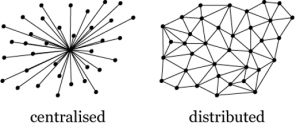How will the rise of Blockchain Technology affect eCommerce?
What is Blockchain?
In the past couple of years, there has been a huge rise in the popularity of cryptocurrencies. The total market capitalization for cryptocurrency has risen tenfold since January 2020 and terms like Bitcoin and Ethereum have reached household name status.
Despite blockchain projects being in the works as early as 1991, the technology is so revolutionary that the first blockchain, Bitcoin, was only fully released in 2009. The asset has gone quite far since then, starting at $0 in 2009 and hitting an all-time high of over $60,000 in 2021. However, blockchain technology is not all about money, it is far more versatile than that.
Blockchain technology is relatively new and the underlying concepts which facilitate it are beyond the scope of this article, but you are interested there is an article here that does a fantastic job of explaining how it all works.
Blockchain vs the traditional financial system
To demonstrate the power of blockchain technology, it’s best to compare Blockchain finance against traditional finance to see how impactful it can be. Let’s discuss the three key differences between them:
Decentralized: Picture a traditional bank, they have tonnes of data all located on thousands of computers in a single server farm. It is entirely centralized, leaving it vulnerable to crashes or attacks. A blockchain’s data is instead distributed amongst thousands of computers worldwide, meaning there is no one weak spot that a hacker could infiltrate. The figure below illustrates how this is useful.

Immutable: Immutability essentially means unchangeability. A traditional ledger is maintained by a single entity, and it is possible for the ledger to be altered. Blockchains are coded in such a way that it is impossible for any entity to manipulate, replace or falsify data.
Transparent: Due to its decentralized nature, a blockchain’s entire transaction history can be viewed by anyone at any time. Instead of banks and other institutions having a monopoly on data, all participants in the blockchain’s network have a shared version of data. Data on the blockchain is thus more accurate, transparent and inclusive.
Blockchain for eCommerce
I’ve explained some of the features that make Blockchains so powerful and innovative. Blockchain technology is only just getting started; come the next decade we are sure to see it in a wide variety of domains, including Finance, Insurance, Data Storage, Voting, Security and of course, eCommerce. Let’s look at how Blockchain technology is set to change eCommerce forever.
Transaction speed: One salient advantage of using Blockchain in eCommerce is the speed of transactions. Let’s say I am selling wallets on my traditional eCommerce website. The customer would likely use a 3rd party payment system and the transaction can take 1-3 working days to confirm and enter my business account. This is where Blockchains come in: my customer could instead opt to purchase a wallet with a certain cryptocurrency, e.g., Bitcoin. This payment cuts out the middleman and is confirmed in around 10-20 minutes (or faster with some cryptocurrencies), and then seamlessly enters my business account.
Cost reduction: eCommerce businesses can cut costs using cryptocurrencies. Banking institutions charge fees to facilitate transactions. These fees can be greatly reduced with cryptocurrencies, with some Cryptos, such as Ripple or Litecoin costing a fraction of a cent to make an instantaneous payment.
Enabling trade from 3rd world countries: More than half of Africa is unbanked, meaning they have no way of purchasing products or services online. The advent of cryptocurrencies means anyone with a phone can now purchase from an eCommerce website. Blockchain technology is bringing the business world together.
Cyber security: Blockchains are decentralized, and a company’s data will be distributed across several nodes. This is why infiltrating the network is nearly impossible- each node in the network will fight back against a potential attack and thus a hacker must simultaneously take control of over half of the network to gain consensus, this is known as a 51% attack. Anybody who has their data stored on a blockchain can relax knowing their data has almost no chance of being compromised.
Genuine reviews: Blockchains will lay the foundation for generating genuine reviews for eCommerce websites. The transparency of the blockchain means each review can be explicitly linked to purchase and thus fake reviews will become blatant. The immutability feature of blockchains means reviews cannot be changed later down the line (without everyone knowing).
Supply chain monitoring: Blockchain technology can be used by eCommerce websites to confirm the legitimacy of the supply chain. Poor practices by someone down the supply chain, e.g., passing inorganic food as organic, can be eradicated using blockchain technology. Blockchain’s immutable and transparent nature means each stage of the supply line is held accountable.
Maersk, the world’s largest shipping company, is already utilising blockchain technology to aid its supply chain. The technology Maersk is using, TradeLens, offers a transparent view of the entire shipping process for everyone who plays a part in the supply chain. TradeLens is also reducing human error and helping to automate and digitize shipping paperwork, which Maersk states are a fifth of the shipping cost alone.
We’ve seen how Blockchain has the potential to drastically change the eCommerce world forever. But there is still a long way to go. Government concerns surrounding tax-dodging and money laundering mean that there’s always the chance that cryptocurrencies could get banned in certain countries. Resistance to Blockchain doesn’t just come from the government though, and lack of education around the topic means the public are sceptical to use the new tech. Until we get from niche to mainstream, the power of blockchain won’t be fully realised. Presently, there are still some issues with transaction speed and cost- Ethereum for example, currently have an average transaction fee of over $20, and until this is fixed mainstream adoption of Ethereum and other Cryptocurrencies seems hard to fathom. Speed of transaction is also a barrier here, and currencies like Bitcoin, which handle only around 5 transactions per second, are not yet capable of being the world’s primary financial medium.
Despite the hurdles Blockchain faces, many of us remain confident that it will have a significant impact on the world. With many existing use cases, this is already happening- and as the technology advances and enters the mainstream, you have the choice to get on board or to fall behind. In eCommerce, those who stand by existing technologies in favour of Blockchain, are sure to be left by the wayside.
At Adapt Talent, we love seeing how technology expands and changes and drives our recruitment space. To keep updated with eCommerce innovations and career opportunities through AR, ML and eCommerce follow Adapt Talent on LinkedIn

